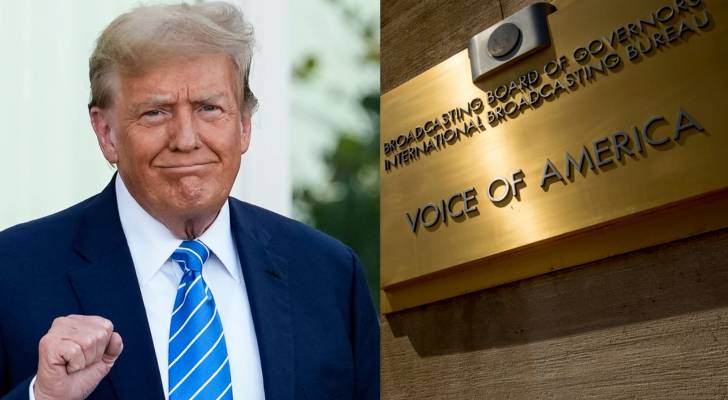(Photo: Getty Images)
Trump’s Voice of America cuts: Impact on China, global media
President Donald Trump’s recent cuts to US government-run media organizations, including Voice of America (VOA), may be welcomed by China’s Communist Party.
The decision, which places almost the entire staff of VOA on leave, is part of broader efforts to scale back the functions of several US government agencies, including the US Agency for Global Media (USAGM).
USAGM oversees not only VOA, but also Radio Free Europe/Radio Liberty (RFE/RL) and Radio Free Asia.
The cuts, timing
The cuts came after Congress passed a new funding bill on Friday, with Trump directing his administration to reduce the operations of several agencies to the minimum required by law.
On Saturday morning, Kari Lake, a senior adviser to USAGM and Trump ally, confirmed that staff members at VOA had been placed on paid administrative leave, with notices sent to employees.
This decision marks a significant shift in US foreign media policy, as VOA and its affiliates have been critical sources of independent news, especially regarding China.
Impact on VOA, Radio Free Asia
VOA, particularly its Chinese-language website, has often reported stories that are ignored by Chinese state-controlled media. It has provided an alternative narrative on issues such as human rights and censorship in China.
Similarly, Radio Free Asia, which broadcasts in Chinese, has been active in covering sensitive topics like the treatment of Uighur Muslims in Xinjiang and the situation in Tibet.
These cuts are seen as a blow to independent reporting on China, leaving a gap that China’s state-run media may fill.
Reaction from China
While Chinese officials did not comment directly on the cuts, a spokesperson for China’s Foreign Ministry, Mao Ning, took the opportunity to criticize VOA and similar outlets.
Mao emphasized the poor track record of these media in reporting on China, calling their coverage “not a secret.”
Chinese state-run media outlets have praised Trump’s decision. An editorial in Global Times referred to VOA as a “lie factory” and a “carefully crafted propaganda machine,” criticizing its coverage of China’s treatment of Uighurs, territorial disputes, and economic challenges.
Global Reactions
The cuts have sparked concern in Europe, with critics seeing it as a loss of democratic values in international broadcasting. However, in China, Russia, and Iran, the decision has been met with enthusiasm.
Russia’s state-backed media celebrated the cuts, with Margarita Simonyan, editor of RT, calling it “awesome” and noting that the US had effectively “shut them down” itself.
The Russian government has long been critical of RFE/RL for its coverage of Russian policies, particularly concerning the Ukraine conflict.
The Bigger Picture
The Trump administration’s decision comes at a time of heightened tensions between the US and China. Beijing has long criticized US-backed media for their portrayal of Chinese policies and has sought to counter-narratives it deems unfavorable.
With the reduction of US government-run media, China and other authoritarian regimes are likely to continue strengthening their own propaganda apparatus, filling the gap left by VOA and other international broadcasters.
Looking Ahead
While the global reaction to these cuts has been divided, the long-term effects on global media and US influence remain unclear.
For now, China and its allies seem to be benefiting from the reduced US media presence, which may have lasting implications for international reporting and the freedom of the press.




